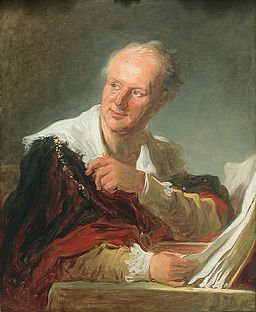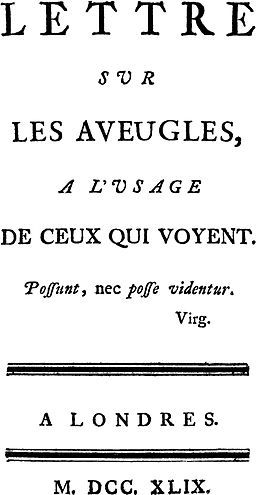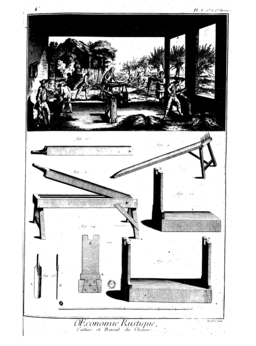Imprinted Life discussion
"Diderot and the Art of Thinking Freely" / Andrew S. Curran
date newest »
newest »
 newest »
newest »
 Chapter One more or less describes Denis Diderot's youth, portraying him as indeed made of a different stamp. Of course, that posture of questioning authority, of sometimes being an imp for tricking others, and of not following strictly common-sense advice due to its exclusion of feeling all boiled together gave him the ignominious label of a free thinker.
Chapter One more or less describes Denis Diderot's youth, portraying him as indeed made of a different stamp. Of course, that posture of questioning authority, of sometimes being an imp for tricking others, and of not following strictly common-sense advice due to its exclusion of feeling all boiled together gave him the ignominious label of a free thinker. Chapter Two surveys the intellectual climate of the eighteenth century. At this period in Europe, Diderot came to know the revolutionary ideas about creation from thinkers such as the philosophes. Voltaire, Spinoza, Rousseau, and ancient Greek materialists challenged religious beliefs in favor of more scientific and mathematical processes While Diderot argued for a skeptical outlook, he retains his perspective, some of which is in his written contributions to L'encyclopédie. It was among his earlier publications of skepticism and ribaldry, such as Philosophical Thoughts and other texts among others, which actually got him solitarily confined for a few months.
Portrait of Diderot by Fragonard

 Chapter Three describes some of the moral compromises, that is, lies tod, by Diderot through the necessity of keeping out of prison for his previously and anonymously published, heretical writings. It seems that his L'Encyclopedie would be less scrutinized. There's an interesting reference to Rousseau, who visited the French philosophe. J-JR claimed that progress and morality were in opposition, the rise of one being the downfall of the other. Whether, like Diderot, he believed that split or let it be known to protect himself would be of interest to know. At this period in eighteenth-century France in the reign of Louis XV, spies tracked critics of the government, taxes, religion, publications, etc., thereby filling the Bastille and Diderot's temporary confinement in Vincennes.
Chapter Three describes some of the moral compromises, that is, lies tod, by Diderot through the necessity of keeping out of prison for his previously and anonymously published, heretical writings. It seems that his L'Encyclopedie would be less scrutinized. There's an interesting reference to Rousseau, who visited the French philosophe. J-JR claimed that progress and morality were in opposition, the rise of one being the downfall of the other. Whether, like Diderot, he believed that split or let it be known to protect himself would be of interest to know. At this period in eighteenth-century France in the reign of Louis XV, spies tracked critics of the government, taxes, religion, publications, etc., thereby filling the Bastille and Diderot's temporary confinement in Vincennes. 
 This story puts the creation and publication of the 18th-century Encyclopédie in a cultural context. One of its cousins nowadays might be Wikipedia, which strives to be an organized compendium of the world's knowledge with cross-references to related articles. The Enlightenment is the historical background, the intellectual break from the prior period of conformity to religious superstition and absolutist monarchy in France. Many well-known intellectuals of the period and just prior bring scholarship to the encyclopedia's contents. When its scientific assertions conflicted with orthodoxy, the publishers needed to be careful to stay out of trouble with censorial state authorities upon the pain of gruesome death or imprisonment. Philosophes and many other specialists, as well as illustrators, go on learning expeditions to learn more facts to contribute their expertise and add to the big book.
This story puts the creation and publication of the 18th-century Encyclopédie in a cultural context. One of its cousins nowadays might be Wikipedia, which strives to be an organized compendium of the world's knowledge with cross-references to related articles. The Enlightenment is the historical background, the intellectual break from the prior period of conformity to religious superstition and absolutist monarchy in France. Many well-known intellectuals of the period and just prior bring scholarship to the encyclopedia's contents. When its scientific assertions conflicted with orthodoxy, the publishers needed to be careful to stay out of trouble with censorial state authorities upon the pain of gruesome death or imprisonment. Philosophes and many other specialists, as well as illustrators, go on learning expeditions to learn more facts to contribute their expertise and add to the big book.This picture shows that factual knowledge from all walks of life became part of the book headed by Diderot and d'Alembert.

Books mentioned in this topic
Encyclopédie: Ou dictionnaire raisonné des sciences, des arts et des métiers (other topics)Philosophical Thoughts and other texts (other topics)



Part One: The biographical part of linear events in Diderot's life starts with Diderot's birth in 1713 into a family of knife-makers (cutlers) and tanners in Langres (the Grand Est region of France). Adulthood life then and there began about age seven. Diderot has a career choice between the family trades or the priesthood in which he'd already made advancements. The narrative moves to the more messy city of Paris; his father enrolls him there.